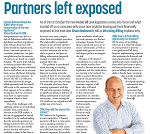On 1st October the new Mobile Bill Limit legislation came into force and what started off as a consumer-only issue now could be leaving wholesale partners financially exposed.

Shaun Bodsworth, Managing Director of Inform Billing, spent over a decade working directly in mobile resale and passionately believes in the channel. Shaun was recently interviewed by Comms Business magazine to explain his concerns around the legislation. Here is the full interview:
Comms Business Magazine (CBM): What is your interpretation of the new legislation?
Shaun Bodsworth (SB): Interpretations vary, due to a lack of definitions within the legislation and lack of guidance from Ofcom about how bill limits should be implemented. From a network operator to a consumer perspective, it’s quite straightforward as the majority of contracts are based on a single handset. We know from talking to various partners that some plan to apply a limit to individual devices and others on an account basis, across all phones belonging to one particular customer. In theory ‘the bill’ is a collective, individual devices do not get billed separately and the overall bill is sent to the customer, but there appears to be no right or wrong, just that the customer must have an opportunity to request a limit to their expenditure.
One of the challenges with applying a limit on an individual number basis, particularly relevant in the B2B market, is the use of aggregated or shared bundles. It is my understanding that the network operators are telling customers they can have a bill limit set on a per-mobile device, but this will not be available to them if they have a shared bundle tariff.
CBM: What is the channel risk?
SB: The biggest risk factor for the channel is availability and processing of billing data in a timely and automated way. This becomes even more complex when there are multiple providers involved – it is not unusual for the chain to involve a mobile network, a mobile service provider, a distributor or aggregator and then the end-reseller. The end-reseller is completely reliant on the network operator to provide data to their customer and then everyone else in the chain to process and pass on billing information frequently enough to enable them to manage their risk.
The problem is exacerbated when factoring in roaming data, particularly from more disparate roaming networks outside of the EU. For example, in the US there are many small networks who pass data to larger US networks who have direct roaming agreements with the UK network operators, leading to significant delays in delivery of billing information to each and every party. A user visiting the US could run up a significant bill within just a few hours. Even a relatively high bill limit could be exceeded before the billing data is fed back to the UK network operator, let alone passed down the chain to the end-reseller to action. Whilst Ofcom’s guidance states that they accept such delays will mean a delay in notifications being sent to the customer to advise that they have or are close to exceeding any limit, the financial burden falls entirely on the end-reseller to comply with the legislation, honour the bill limit and absorb any excess charges.
This is particularly pertinent when the end-customer has significantly greater financial resources than the end reseller. We work with resellers turning over circa £2m that supply mobile service to multi-national organisations with turnover in excess of £1billion – yet the burden of risk over and above a bill limit sits solely with the end-reseller. How is this fair when only the customer themselves has any control over their users, what is acceptable and where they travel?
CBM: How will this impact the market?
SB: I believe the legislation is anti-competitive. Channel partners will have to take great care in deciding whether to take on a customer who insists on a bill limit, because of their financial exposure. Particularly if the customer is likely to use roaming services and if their own supplier cannot provide access to ‘real time’ or as close to, billing information. There is no requirement to provide information in any given timeframe, which puts network operators at a distinct advantage, because they have direct control and access to ‘at source’ information, as well as significantly greater resources and deeper pockets to mitigate the risk.
Whilst DCMS have written to us directly to confirm Ofcom have stated they will not start an immediate enforcement campaign and will rely on complaints, it is very difficult to predict what will happen and where the law will side when a customer who is not offered a bill limit, or who exceeds such a limit, refuses to pay. In a bill shock situation, Ofcom’s supposed ‘light touch’ may not help resellers to recoup bad debt.
Over the past six months we have been lobbying government ministers with responsibility for small and medium businesses and within the Department for Digital, Culture, Media and Sports (DCMS), which is responsible for bringing in the legislation. We understand there was consultation with mobile operators, but despite numerous requests we have been unable to ascertain who was involved. There appears to be little, if any, consideration given to the independent reseller channel and we are attempting to educate the DCMS of the wider implications, in the interest of competition.
Because of the limited consultation, it is only recently that mobile resellers have started to become aware of the legislation and the implications are starting to be realised. In order to protect themselves, many of our partners have indicated that where a customer requires a bill limit, they will need to consider changes to the commercial proposition or a further assessment on risk versus revenue opportunity. Unfortunately, in many cases resellers may be forced to walk away from an opportunity where margins are not sufficient to warrant the risk. Some partners have gone as far to say they may even withdraw from selling mobile services all together.
CBM: How is Inform Billing addressing the situation?
SB: Inform Billing’s advice to resellers is wherever possible to dissuade the customer from setting a bill limit, but instead to devote resources into reporting and providing proactive spend management services to the customer, without becoming financially liable for expenditure beyond the resellers control. We have been enhancing our software to better equip our partners to provide these services.
In terms of our billing software, it is relatively simple to assist partners to provide a straightforward bill limit, however implementing solutions that minimise the financial risk and administrative burden are significantly more complex. For those who have limits in place, we have mechanisms to auto process billing information on a daily or hourly basis, assuming data is made available. We have also developed reporting information that can identify customers that have or are likely to exceed any bill limit.
I agree with the principle of the DCMS’s original statement to “help protect consumers from ‘bill shock’ by requiring mobile network operators to offer a bill capping facility.” However, it is my belief that the underlying intention of the legislation has been lost because of all encompassing definitions and changes to the Telecommunications Act. We now have a situation where SMEs will be unfairly disadvantaged, or potentially put out of business, because of an oversight, lack of understanding and insufficient consultation.





